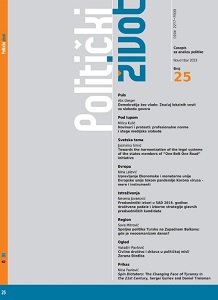Towards the Harmonization of the Legal Systems of the States Members of “One Belt One Road” Initiative
Towards the Harmonization of the Legal Systems of the States Members of “One Belt One Road” Initiative
Author(s): Jasminka SimićSubject(s): Supranational / Global Economy, International Law, International relations/trade, Commercial Law
Published by: Fakultet političkih nauka Univerziteta u Beogradu
Keywords: China International Commercial Court; legal infrastructure; investment; settlement of disputes; “one stop” dispute resolution mechanism; OBOR Initiative;
Summary/Abstract: More then 150 countries from Europe, Asia, Africa and Latin America are connected through „One Belt One Road“ (OBOR) Initiative which implies policy coordination (construction of large infrastructure facilities), trade and investment facilitation, financial integration (coordinated monetary policy and bilateral financial cooperation) and people to people policy (cultural exchange). This significantly increases the volume of cross-border transactions and development in the field of electronic commerce, migration and tourism. Comprehensive cooperation has set up the legal framework through the improvement of policies and laws, the establishment of legal infrastructure and the settlement of legal disputes mechanism. Thus the president of the Supreme People’s Court of China announced in 2018 the establishment of an International Commercial Court, consisting of three tribunals in Xi’an, Shenzhen and Beijing, for mediation, arbitration and litigation. The contribution of this author’s work is in the detailed analysis of existing international treaties binding for the States Members of OBOR Initiative, including the ones between China and Serbia, and the new legal mechanism established in order to institutionalize the cooperation in the area of the rights for all participants in the trade and investment agreements (eg. new tendencies in the development of arbitration law). The author emphasises that all investors in the world prefer the country they are entering to be resistant to corruption, with the rule of law observed and having an objective judiciary system capable to act. At the same time, this also gives the chance that, apart from the rights of investors, the rights of employees to be improved and thus generally upgrade the standards of the rule of law on which democracy basicaly stands.
Journal: Politički život
- Issue Year: 2023
- Issue No: 25
- Page Range: 39-57
- Page Count: 19
- Language: English

